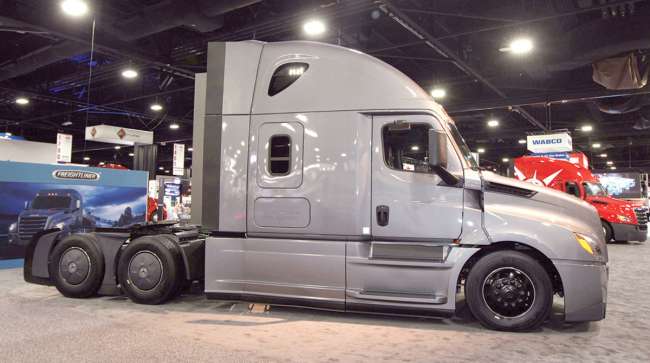Staff Reporter
Class 8 Sales Fall in September for Second Consecutive Month

[Stay on top of transportation news: Get TTNews in your inbox.]
Class 8 retail sales in September fell from the year-ago period for a second straight month, Wards Intelligence data show.
Sales declined 3.2% to 22,231 units from 22,971 in 2022 while also dropping 4.8% sequentially from 23,342 sold in August.
“The U.S. industry [retail sales] came in a couple less thousand units than expected, and also the Canadian retails were lower than expected. It may be too early to draw some real conclusions, but it may be an indicator that we now also see the expected market slowdown” affecting retail numbers, Magnus Koeck, vice president of Strategy, Marketing and Brand Management at Volvo Trucks North America, said in an email.
Analysts were also somewhat surprised, although they too said the weighting attributed to the decrease should not be overly heavy-duty.

Starks
September sales were just a little bit below expectations at around 700 units or so, FTR Transportation Intelligence Chairman Eric Starks said in an Oct. 17 phone interview, adding that this figure matched the normal deviation levels. “It is not overly concerning,” he said.
“One number doesn’t upset the apple cart,” ACT Research Vice President Steve Tam told TT Oct. 16. ACT had expected year-on-year and month-on-month growth. “We were a little bit surprised,” he said.
The research group still has a reasonably healthy forecast for 2023. ACT expects Class 8 retail sales in 2023 to total 278,000, he noted, a 7% year-on-year increase.
Class 8 sales through the first nine months of 2023 were up 12.9% to 202,335 units, compared with 179,247 at this time in 2022.
Wards found that sales declined year-over-year in September at four of the seven major truck makers:
- Daimler Truck North America’s Freightliner brand took the largest market share with 7,869 trucks sold, accounting for 35.4% of all sales, compared with 8,395 last year. But Western Star, another DTNA brand, posted the largest percentage increase in sales with a 76.3% spike to 691 units from 392.
- Kenworth Truck Co.’s sales declined 4.7% to 2,998 units from 3,146, while Peterbilt Motors Co. saw sales rise 4.2% to 3,456 from 3,317. Both are brands of Paccar Inc.
- Navistar’s International brand reported a 16.8% decrease in sales to 3,202 from 3,848.
- Volvo Trucks North America’s sales declined 1.6% year-over-year to 2,393 from 2,432. But Mack Trucks’ sales increased 12.6% to 1,622 units from 1,441, according to Wards. Mack Trucks and VTNA are brands of Volvo Group.

Koeck
“When it comes to our own numbers, we recovered in the U.S. during September and ended up at 10.8% [of the market] for the month, but we’re still not yet out of the woods when it comes to supply chain disturbances,” VTNA’s Koeck said in an email. VTNA took a 9.1% share in August.
Vocational markets in particular are still having challenges taking delivery of vehicles, Tam said, noting that vocational buyers account for a quarter to a third of all buyers. Outfitters and original equipment manufacturers are having trouble getting parts, which is slowing down the process, he added.
October’s sales are expected to be better, analysts say.

Tam
Truck makers’ U.S. production numbers in August were decent, Tam said, at around 25,000, which is why September sales were expected to be higher. “A lot of the [later] retail sales transactions have taken place, but the paperwork is still going through, which means that October should be above expectations,” he said.
ACT expects Class 8 sales to total 70,000 units in the fourth quarter of 2023.
Starks noted that orders jumped in September for the first time since December, adding to the industry backlog. Preliminary ACT data show September orders totaling 36,800 units, compared with 19,000 in August.
Trimble CEO Rob Painter discusses the company’s continued investment in the freight transportation industry and its vision for a more connected supply chain. Tune in above or by going to RoadSigns.ttnews.com.
FTR expects sales in the fourth quarter of 2023 to average 23,600 units per month, a slight rise compared with September. Average monthly sales in 2023 are set to come in at 22,500 a month, said Starks, noting that fourth-quarter sales are usually higher than the rest of the year.
Starks expects production to fall in Q4 and drop off yet further in the first three months of 2024. The first quarter of the year is usually slower, but Starks expects a larger-than-typical decrease to begin 2024. FTR forecasts sales will average 19,800 units a month in Q1.

Croke
Sales are also likely to be hurt by the surge in the price of diesel in the third quarter, DAT Freight & Analytics Principal Analyst Dean Croke said in an Oct. 18 interview.
Two months after a diesel market surge, smaller carriers start to exit the market as they hit a cash crunch, said Croke, and data at the mid-month mark show October is seeing an unprecedented number of exits. Entry and exit levels impact used sales, which in turn impact new sales.
That said, carriers exiting the industry will lead to an increase in spot rates, which will boost contract rates, and eventually new sales, he noted.
One extra variable for sales expectations through the final quarter of the year is a United Auto Workers strike at two Mack Trucks production sites. As Tam told TT: “If you don’t build it, you can’t sell it.” The UAW represents Mack Trucks workers at the Lehigh Valley Operations and Hagerstown Powertrain Operations in Pennsylvania and Maryland, respectively.
Want more news? Listen to today's daily briefing below or go here for more info:





